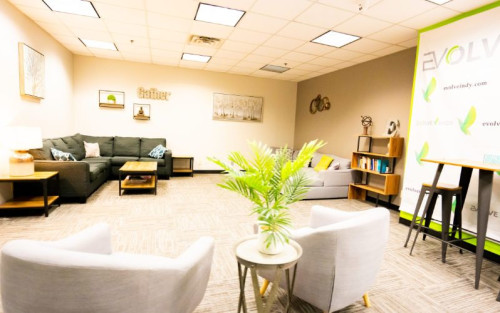






Evolve Indy
Verified Center
This provider's information has been quality-checked by Recovery.com's Research Team for accuracy and completeness, including center verification through appropriate third-party organizations.
Treatment Focus
This center treats substance use disorders and co-occurring mental health conditions. Your treatment plan addresses each condition at once with personalized, compassionate care for comprehensive healing.
Primary Level of Care
Outpatient treatment offers flexible therapeutic and medical care without the need to stay overnight in a hospital or inpatient facility. Some centers offer intensive outpatient program (IOP), which falls between inpatient care and traditional outpatient service.
Treatment Focus
This center treats substance use disorders and co-occurring mental health conditions. Your treatment plan addresses each condition at once with personalized, compassionate care for comprehensive healing.
Primary Level of Care
Outpatient treatment offers flexible therapeutic and medical care without the need to stay overnight in a hospital or inpatient facility. Some centers offer intensive outpatient program (IOP), which falls between inpatient care and traditional outpatient service.
Provider's Policy
Insurance Can Help Pay for Treatment. Evolve Indy works with most major insurance providers to ensure the lowest out-of-pocket costs when you enter treatment at our facility.
Evolve Indy
Evolve Indy
About Evolve Indy
Evolve Indy began with a single mission: to help those struggling with substance misuse, regardless of their situation. They understand there is no “one-size-fits-all” approach to addiction treatment, which is why their program centers on individualized care. From inpatient residential programs to outpatient treatment options, Evolve Indy ensures there’s a treatment option to fit clients’ unique needs and schedule. They also offer free assessments and same-day admissions to meet clients where they're at. Evolve Indy uses a combination of traditional, holistic, and modern therapies to effectively treat the root cause of addiction. Guided by a team of expert therapists, clients can address their addiction and reconnect with themselves and discover a new passion for life. Evolve Indy’s treatment center offers a wide range of therapies, including 1-on-1 counseling using cognitive behavioral therapy (CBT), relapse prevention, art and music therapy, and 12-Step facilitation.
Convenient Location And Empathetic Staff
Evolve Indy’s central, Indianapolis location allows for international travel. They have different facilities for men and women to give each group the widest range of benefits throughout their treatment. At each, clients can enjoy luxurious overnight accommodations and leisurely amenities like pools and quiet seating areas. Their staff members are credentialed and well-versed in addiction–most of them have been there themselves.
Comprehensive, Effective Treatment
Evolve Indy takes a comprehensive approach to treatment. They use a variety of treatment approaches to help heal and nurture clients’ mind, body, and spirit. Evolve Indy uses traditional therapy, like the 12-Steps, and holistic and modern therapies to ensure an effective fit for everyone. Notably, Evolve Indy also offers a specialized adventure program. Their adventure program works in tandem with therapeutic healing by getting program members outside and active, proving to them the joy that lies in sober living.
Self-Sufficiency Paired With Quality Care
Evolve Indy strives to give independence and freedom throughout clients’ treatment. They allow cell phones, shopping trips, a weekly budget for food, and they create a theme of self-sufficiency through money management and scheduling. Evolve Indy’s gender-specific housing allows for a complete focus on treatment. Clients can also enjoy leisurely amenities at each house, like a pool, access to nature, and flatscreen TVs in each room. Evolve Indy’s facilities are highly secure, as they take care to guard clients’ privacy and maintain an atmosphere of complete safety.

Highlights from the Center
Highlights
These highlights are provided by and paid for by the center.
Insurance Accepted
Joint Commission Accredited
Therapeutic Location
Holistic Approach
Center Overview
Treatment Focus
This center treats substance use disorders and co-occurring mental health conditions. Your treatment plan addresses each condition at once with personalized, compassionate care for comprehensive healing.
Joint Commission Accredited
The Joint Commission accreditation is a voluntary, objective process that evaluates and accredits healthcare organizations (like treatment centers) based on performance standards designed to improve quality and safety for patients. To be accredited means the treatment center has been found to meet the Commission's standards for quality and safety in patient care.

Insurance Accepted
Cash Pay Rates
Estimated Cash Pay Rate
Center pricing can vary based on program and length of stay. Contact the center for more information. Recovery.com strives for price transparency so you can make an informed decision.
Meet Your Care Team

Dr. Vahid Osman
Medical Director
MD

Annie Perconti
Clinical Director
LCAC

Brittany Nowak
Psychiatric Mental Health Nurse Practitioner
PMHNP

Joseph Jones
Case Manager
BSW

Lauren Fraser
Director of Operations

Jake Bowman-Shaw
Facility Manager




Levels of Care








Your Care Options
Specializations
Alcohol
Using alcohol as a coping mechanism, or drinking excessively throughout the week, signals an alcohol use disorder.
Drug Addiction
Drug addiction is the excessive and repetitive use of substances, despite harmful consequences to a person's life, health, and relationships.
Family Involvement
Providers involve family in the treatment of their loved one through family therapy, visits, or both–because addiction is a family disease.
Trauma
Some traumatic events are so disturbing that they cause long-term mental health problems. Those ongoing issues can also be referred to as "trauma."
Who We Treat
Young Adults
Emerging adults ages 18-25 receive treatment catered to the unique challenges of early adulthood, like college, risky behaviors, and vocational struggles.
Midlife Adults
For adults ages 40+, treatment shifts to focus on the unique challenges, blocks, and risk factors of their age group, and unites peers in a similar community.
Approaches
Evidence-Based
A combination of scientifically rooted therapies and treatments make up evidence-based care, defined by their measured and proven results.
Family Involvement
Providers involve family in the treatment of their loved one through family therapy, visits, or both–because addiction is a family disease.
Individual Treatment
Individual care meets the needs of each patient, using personalized treatment to provide them the most relevant care and greatest chance of success.
Personalized Treatment
The specific needs, histories, and conditions of individual patients receive personalized, highly relevant care throughout their recovery journey.
Therapies
1-on-1 Counseling
Patient and therapist meet 1-on-1 to work through difficult emotions and behavioral challenges in a personal, private setting.
Cryotherapy
Stepping into a chamber of extreme cold floods the bloodstream with nutrients and endorphins, helping reduce withdrawal symptoms and cravings.
Rational Emotive Behavior Therapy
A type of cognitive therapy that identifies negative self-defeating thoughts and behaviors, rewriting beliefs to be positive, empowering, and present.
Mindfulness Therapy
This ancient practice can be mental, emotional, and even spiritual. In meditation, you focus your attention on the present moment without judgement.
Adventure Therapy
This experiential approach uses the physical and emotional challenges of outdoor activities as tools for personal growth.
Attachment-Based Family Therapy
ABFT is a trauma-focused therapy that teaches you to form healthy relationships by rebuilding trust and healing attachment issues formed in childhood.
Animal Therapy
Animals can inspire trust and self-worth. In this experiential therapy, guided interactions are used to improve social skills and emotion regulation.
Aromatherapy
Inhaling or topically applying essential oils can help relieve stress, soothe pains, and relieve emotional distress.
Conditions We Treat
Grief and Loss
Grief is a natural reaction to loss, but severe grief can interfere with your ability to function. You can get treatment for this condition.
Bipolar
This mental health condition is characterized by extreme mood swings between depression, mania, and remission.
Codependency
Codependency is a pattern of emotional dependence and controlling behavior. It's most common among people with addicted loved ones.
Depression
Symptoms of depression may include fatigue, a sense of numbness, and loss of interest in activities. This condition can range from mild to severe.
Post Traumatic Stress Disorder
PTSD is a long-term mental health issue caused by a disturbing event or events. Symptoms include anxiety, dissociation, flashbacks, and intrusive thoughts.
Trauma
Some traumatic events are so disturbing that they cause long-term mental health problems. Those ongoing issues can also be referred to as "trauma."
Substances We Treat
Alcohol
Using alcohol as a coping mechanism, or drinking excessively throughout the week, signals an alcohol use disorder.
Benzodiazepines
Benzodiazepines are prescribed to treat anxiety and sleep issues. They are highly habit forming, and their abuse can cause mood changes and poor judgement.
Chronic Relapse
Consistent relapse occurs repeatedly, after partial recovery from addiction. This condition requires long-term treatment.
Co-Occurring Disorders
A person with multiple mental health diagnoses, such as addiction and depression, has co-occurring disorders also called dual diagnosis.
Cocaine
Cocaine is a stimulant with euphoric effects. Agitation, muscle ticks, psychosis, and heart issues are common symptoms of cocaine abuse.
Drug Addiction
Drug addiction is the excessive and repetitive use of substances, despite harmful consequences to a person's life, health, and relationships.
Ecstasy
Ecstasy is a stimulant that causes intense euphoria and heightened awareness. Abuse of this drug can trigger depression, insomnia, and memory problems.
Heroin
Heroin is a highly addictive and illegal opioid. It can cause insomnia, collapsed veins, heart issues, and additional mental health issues.
Languages
Aftercare
Care Designed for Your Needs
Personal Amenities
Amenities
Special Considerations
Center Pets
Addiction and mental health facilities with pets allow patients to interact with friendly dogs, cats, horses, and in some cases, even dolphins.
Flexible technology policies
Centers with flexible technology policies allow professionals to stay in touch with work and give patients a greater sense of connection and normalcy.
Gender-specific groups
Patients in gender-specific groups gain the opportunity to discuss challenges unique to their gender in a comfortable, safe setting conducive to healing.
Activities
Off-Site Activities
Yoga
Yoga is both a physical and spiritual practice. It includes a flow of movement, breathing techniques, and meditation.

What people are saying
Treatment
4.9
Accommodations
4.9
Food & Nutrition
4.7
Value
4.9
Pros
- Beautiful Location (13)
- Excellent & Effective Treatment Programming (13)
- Supportive Aftercare (13)
- Luxurious Accommodations (12)
Cons
- Poor Internet Connection (4)
DeAnna Griffin, CAPRC II
Reviewed 08/23/22
Referring Professional
•Certified Addiction Peer Recovery Coach II
Emily M.
Treatment in 2022 • (45 days) • Reviewed 08/23/22
Former Client
•N/A
•Terre Haute, IN
Emily M.
Treatment in 2022 • (45 days) • Reviewed 08/23/22
Former Client
•N/A
•Terre Haute IN
Jenna
Treatment in 2022 • (30 days) • Reviewed 10/17/22
Former Client
•Certified medical assistant
•Louisville, KY
April A.
Treatment in 2022 • (35 days) • Reviewed 11/09/22
Former Client
•Nurse
•Indiana, USA





